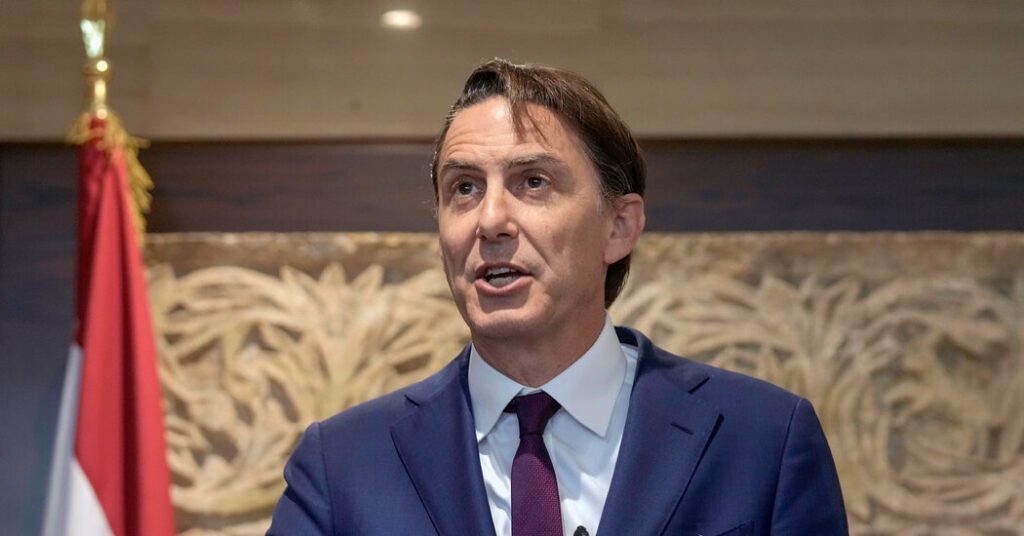Amos Hochstein, a senior adviser to President Biden, met with Lebanese officials in Beirut on Tuesday and urged a diplomatic solution as clashes between Israel and the Iran-backed Lebanese militia Hezbollah become increasingly violent and the situation on the Israel-Lebanon border becomes dangerously unstable.
Over the past eight months, as the war in Gaza has escalated, new fighting has unfolded along Israel's northern border. During that time, Hezbollah and the Israeli military, both well-armed and battle-hardened, have engaged in a dangerous exchange of attacks and shows of force that stop short of full-scale war. Despite apparent caution on both sides, civilians have been killed on both sides and more than 150,000 people have been forced to flee their homes along the border.
Since October, more than 300 Hezbollah fighters and around 80 Lebanese civilians have been killed, while at least 19 Israeli soldiers and eight civilians have been killed.
As fighting rages, miscalculation could plunge both sides into greater tensions: given Hezbollah's fighting prowess, an all-out war between Israel and Hezbollah could be devastating for both countries.
“The situation is serious,” Hochstein told reporters in Beirut. “Tensions have been rising for the last few weeks and President Biden's hope is to avoid further escalation to war.”
“It takes everyone's interest to end this conflict now, but I believe there is a path to get that done diplomatically if both sides agree,” he said.
During his stay in Beirut, Hofstein will not meet with leaders of Hezbollah, which the United States and European Union consider a terrorist organization, and will instead meet only with Lebanese government officials, who have limited influence over Hezbollah.
Hezbollah, Lebanon's most powerful military and political force, is far stronger and better armed than it was when it last went to war with Israel in 2006. Unlike Hamas, the Palestinian militia fighting Israel in Gaza, Hezbollah's forces are highly trained fighters, and the group has long-range precision-guided missiles that can strike targets deep inside Israel. In Israel, military planners still feel the ghost of the Oct. 7 Hamas attack on the northern border, which sent Palestinian militants swarming across the supposedly heavily guarded Gaza barrier. But the concern is that if Hezbollah were to launch a similar attack, it would involve the group's elite forces.
Retired Israeli general Shlomo Blom said the vast amount of munitions in Hezbollah's arsenal, particularly its stockpile of drones, could overwhelm Israel's air defenses in the event of all-out war.
General Blom said Hezbollah fighters were battle-hardened from their experience in the Syrian civil war and had intervened on the side of the Iran-backed Assad regime.
“In a merciless war, there will be much greater destruction both on the civilian home front and deep inside Israel,” said Gen. Blom, the former head of military planning. “They have the capability to target almost anywhere in Israel and they will target civilians just as we are targeting southern Beirut,” Gen. Blom said, referring to the capital area known as a Hezbollah stronghold.
A major escalation would be of similar concern to Hezbollah: Lebanon's economy was in freefall even before the current crisis, and many Lebanese have little desire for a repeat of the 2006 war that resulted in a month of fighting that left more than 1,000 Lebanese and 165 Israelis dead and displaced more than a million.
The current fighting began shortly after Hamas' ally Hezbollah launched attacks on northern Israel in a show of solidarity on Oct. 7. Israel retaliated soon after.
Last week, an Israeli strike killed senior Hezbollah commander Taleb Abdallah, prompting Hezbollah to step up attacks on Israel in retaliation. In the days that followed, Hezbollah launched coordinated attacks on Israel with hundreds of rockets and drones, wounding several soldiers and civilians.
US special envoy Hochstein is visiting the region this week in hopes of easing tensions between the two countries, and on Monday met with Israeli Prime Minister Benjamin Netanyahu, the country's president and defence minister to try to push for a diplomatic solution.
Despite the risks, Netanyahu is facing growing pressure to step up the military operation against Hezbollah at home. Tens of thousands of Israelis from the border remain scattered across the country with no prospect of returning home, and far-right members of his coalition are calling for stronger action, such as the establishment of an Israeli-run “safe zone” inside Lebanese territory.

